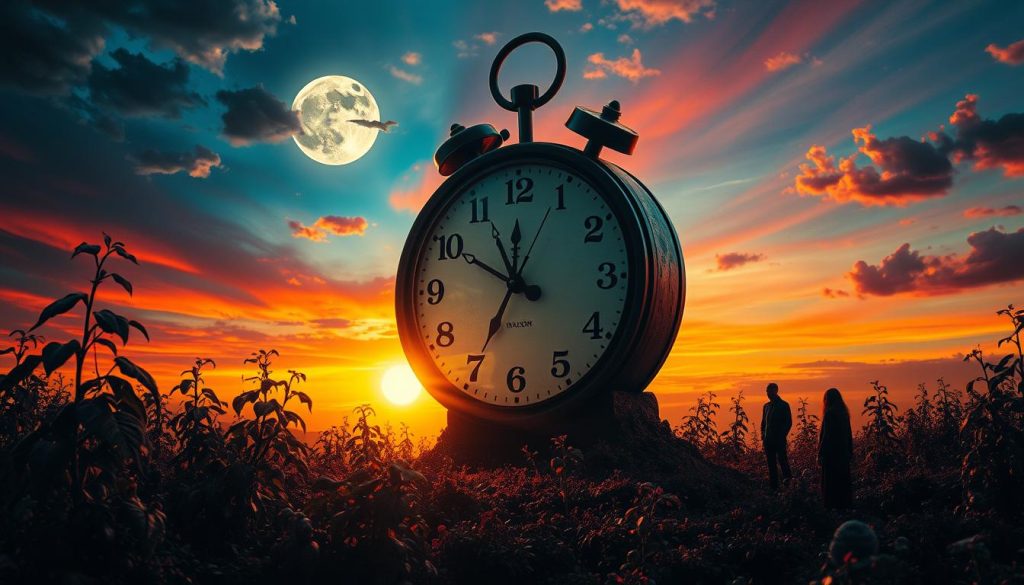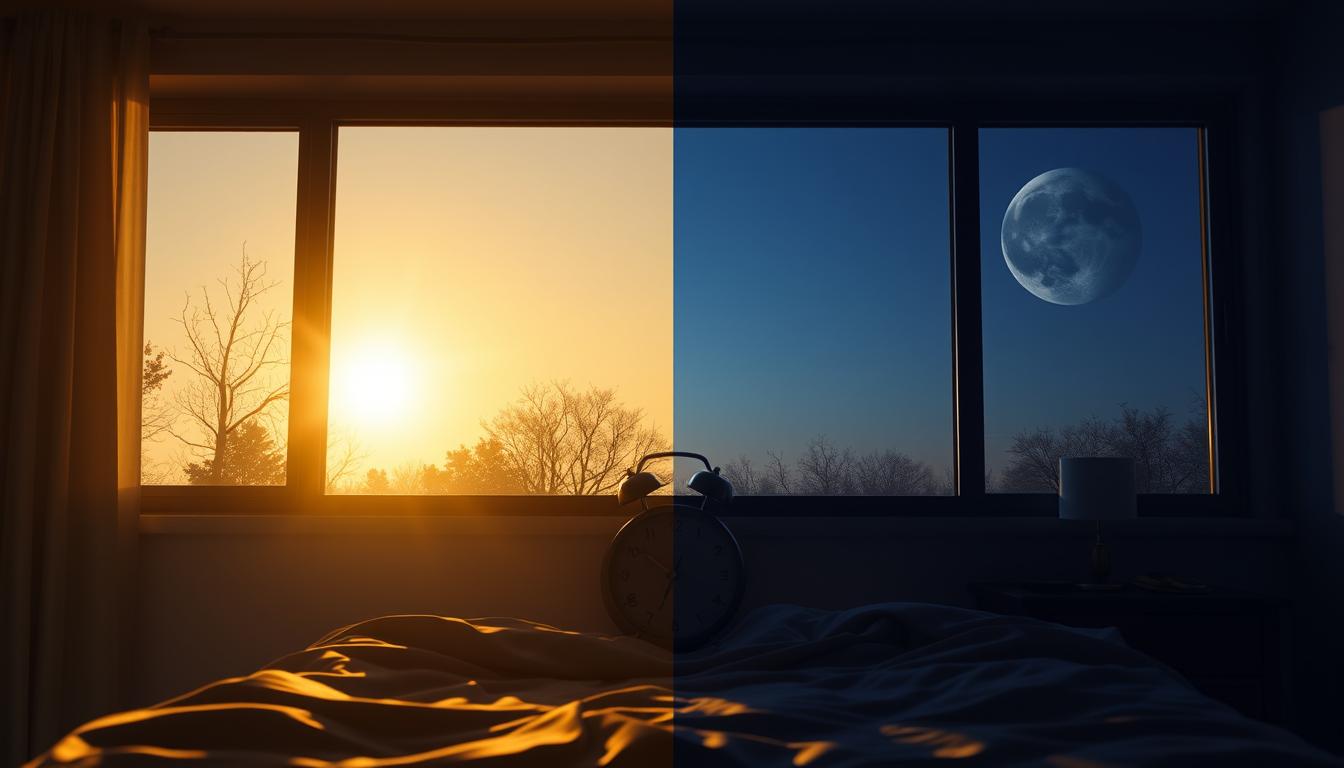Our bodies have an internal clock called the circadian rhythm. It controls our sleep and wake times and other body functions. When this rhythm gets messed up, it can cause health problems. We’ll look into why this happens, its effects, and how to fix it.
Keeping our circadian rhythm healthy is key to feeling good. It affects how well we sleep and our body’s balance. Knowing what disrupts this rhythm helps us avoid health issues. We can then improve our daily life for better health in the long run.
What is Circadian Rhythm?
Our bodies have a natural 24-hour cycle called the circadian rhythm. It controls things like when we sleep and wake up, hormone release, body temperature, and digestion. This cycle is run by the suprachiasmatic nucleus (SCN) in our brain. It’s also affected by light and dark around us.
The Body’s Internal Clock
The circadian rhythm is like our body’s internal clock. It keeps our body’s functions in sync with day and night. The SCN in our brain acts as the main controller. It listens to light signals from our eyes to keep our rhythms in line with the world outside.
Regulating Sleep-Wake Cycles
The circadian rhythm mainly helps control when we sleep and wake up. The hormone melatonin, which makes us sleepy, is released based on this rhythm. When it gets dark, melatonin levels go up, telling our body it’s time to sleep.
When it gets light, melatonin levels go down. This tells our body it’s time to wake up and be alert.
| Circadian Rhythm Phases | Description |
|---|---|
| Awake Phase | During this phase, the body is active, alert, and the sleep-wake cycle is regulated by the circadian rhythm. Melatonin levels are low, allowing wakefulness and productivity. |
| Sleep Phase | As the day winds down, melatonin levels rise, signaling the body to prepare for sleep. The circadian rhythm helps maintain a consistent sleep-wake cycle. |

Causes of Circadian Rhythm Disruption
Our internal clock, or circadian rhythm, controls when we sleep and wake. It can get messed up by jet lag and shift work. These can really mess with our natural sleep patterns.
Jet Lag and Shift Work
Traveling to a new time zone can cause jet lag. This makes it hard to sleep, feel tired during the day, and upset your stomach. Working at night or odd hours also messes with our rhythm. It’s hard for our body to adjust to a schedule that doesn’t match the day and night.
Being around artificial light at night and not sleeping at regular times also messes with our rhythm. Bright light in the evening stops our body from making melatonin. This hormone helps us sleep and wake up.
| Cause | Impact on Circadian Rhythm |
|---|---|
| Jet Lag | Difficulty falling asleep, daytime fatigue, gastrointestinal issues |
| Shift Work | Struggle to adapt to a schedule out of sync with natural light-dark cycle |
| Artificial Light at Night | Suppressed melatonin production, disrupting sleep-wake cycles |
| Irregular Sleep-Wake Patterns | Disruption of the body’s natural rhythms |

Impacts of Circadian Rhythm Disruption
Our internal clock, or circadian rhythm, controls when we sleep and wake. When it’s off, our health and happiness can suffer. Sleep quality and hormone balance are two big areas affected.
Effects on Sleep Quality
When our internal clock is out of sync, we might find it hard to sleep. We might wake up often or not sleep well. This makes us tired and affects our mood and work.
Metabolic and Hormonal Imbalances
Our internal clock also affects how we eat and our hormones. This can change our appetite and weight. It can also mess with hormones like cortisol and melatonin, affecting our health.
| Aspect | Impact of Circadian Rhythm Disruption |
|---|---|
| Sleep Quality |
|
| Metabolism and Hormones |
|

Understanding how our internal clock affects us helps us value its importance. A healthy internal clock is key to our well-being.
Circadian Rhythm Disruption and Health Risks
Keeping a healthy circadian rhythm is key for our health. But, long-term disruption can lead to serious health issues. These include a higher risk of chronic diseases.
Research shows that disrupted circadian rhythms can increase the risk of obesity, type 2 diabetes, heart disease, and some cancers. Our internal clocks control important body functions like metabolism and hormone production.
| Health Condition | Link to Circadian Rhythm Disruption |
|---|---|
| Obesity | Disruption of the body’s internal clock can lead to imbalances in hunger hormones, such as leptin and ghrelin, contributing to weight gain and obesity. |
| Type 2 Diabetes | Circadian rhythm disruption can impair glucose metabolism and insulin sensitivity, increasing the risk of developing type 2 diabetes. |
| Cardiovascular Disease | Disruption of the circadian rhythm can negatively impact cardiovascular function, leading to an increased risk of high blood pressure, heart attacks, and other heart-related issues. |
| Cancer | Disruption of the body’s internal clock has been associated with an increased risk of certain types of cancer, such as breast, prostate, and colorectal cancer. |
Knowing the risks of disrupted circadian rhythms helps us act early. We can keep a regular sleep-wake cycle. This can help lower our risk of chronic diseases.
Managing Circadian Rhythm Disruption
Our body’s internal clock, or circadian rhythm, is key to staying healthy. We can fix it by changing how we use light, our melatonin levels, and our daily habits. This helps us get back in sync.
Light Exposure and Melatonin
Light, especially blue light, helps control our internal clock. We should avoid blue light at night and get lots of natural light during the day. This helps our body make melatonin, the hormone that helps us sleep.
Lifestyle Adjustments
Changing our lifestyle also helps fix our internal clock. Keeping a regular sleep schedule, exercising regularly, and good sleep habits are important. A calm bedtime routine can also help.
- Establish a consistent sleep-wake schedule, even on weekends
- Limit exposure to blue light-emitting devices in the evenings
- Engage in regular physical activity during the day
- Create a relaxing bedtime routine to promote better sleep
By using these tips every day, we can manage our internal clock better. This supports our health and well-being.
The Role of Chronobiology
Chronobiology studies our body’s rhythms. It shows how important it is to keep our internal clocks in sync. These clocks control many things like sleep, hormone levels, and how our body works.
By learning about our internal clocks, we can find better ways to deal with rhythm problems. This helps us stay healthy and feel good.
Understanding Our Internal Clocks
Our circadian rhythm is a 24-hour cycle. It controls when we sleep, our hormone levels, and body temperature. It’s like a master clock in our brain, called the suprachiasmatic nucleus (SCN).
This clock is set by things like light and temperature. If it gets out of sync, we can get sick. This can cause sleep problems and other health issues.
- The SCN acts as the body’s pacemaker, synchronizing various physiological processes with the 24-hour day-night cycle.
- Exposure to light is the primary environmental cue that resets the internal clock, helping to maintain a consistent sleep-wake cycle.
- Disruptions to the circadian rhythm can occur due to factors such as jet lag, shift work, and exposure to artificial light at night.
Knowing about chronobiology helps us keep our internal clocks in check. This knowledge lets us make better choices for our health. It helps us handle many health problems related to our body’s rhythms.
Circadian Rhythm Disruption and Aging
As we get older, our body clocks can get out of sync. This leads to changes in sleep, hormone levels, and health. It’s key for older adults to fix their body clocks to keep their mind sharp and stay healthy.
Our internal clocks can lose sync as we age. This makes it tough to sleep well and feel tired during the day. Hormones like melatonin and cortisol also get out of balance, making things worse.
Keeping our body clocks healthy is vital as we age. It helps our brain, metabolism, and overall health. By managing light, sleep, and lifestyle, we can fight off the effects of disrupted body clocks and stay healthy longer.

